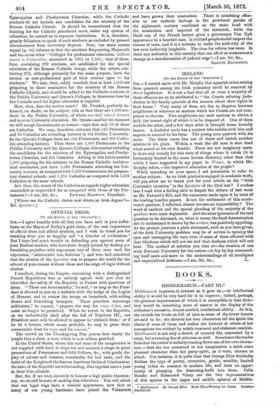IRELAND.
[TO THB EDITOR OF THE “SPROTATOR.1
SIR,—I cannot agree with Mr. Murphy that agrarian crime arising- from quarrels among the Irish peasantry could be removed by direct legislation. It is not a fact that all or even a majority of these offences are to be attributed to "the Courts refusing juris- diction in the family quarrels of the tenants about their rights in their farms." Very many of them are due to disputes between neighbours or relatives on matters which law Courts are not com- petent to discuss. Two neighbours are each anxious to obtain a field, the tenant-right of which is to be disposed of. One of them outbids the other, and a few days after is brought home brutally beaten. A bachelor uncle has a nephew who resides with him and expects to succeed to his farm. The young man quarrels with hie uncle. The latter turns him out of doors and instals another relative in his place. Withiu a week the old man is shot dead when seated at his own fireside. These are not imaginary cases. Is there any remedy for this state of things where it exists (it is fortunately limited to the more lawless districts) other than that which I have suggested in my paper in Fraser, to which Mr. Murphy refers,—the improved education of the people ?
While intruding on your space, I ask permission to refer to another subject. As an Irish graduate engaged in academic work, will you allow me to thank you for your article on the "Irisb University Question" in the Spectator of the 23rd mat? I confess- that I read with a feeling akin to despair the debate of last week on Mr. Fawcett's Bill, and the comments made upon it by most or the leading London papers. Is not the settlement of this much- vexed question, I reflected, almost become an impossibility? The- want of candour and the special pleading of the majority of the speakers were most deplorable. And the utter ignorance of the real question to be discussed, or, what is worse, the fixed determination not to understand it shown by the writers, was positively appalling. At the present juncture a plain statement, such as you have given, of the Irish University problem may be of service in opening the- eyes and unstopping the ears even of some of those affected with that blindness which will not see and that deafness which will not hear. The method of solution you hint at—the creation of one truly National University for the nation—is day by day commend- ing itself more and more to the understandings of all intelligent
and unprejudiced Irishmen.—I am, Sir, &c., L.


































 Previous page
Previous page